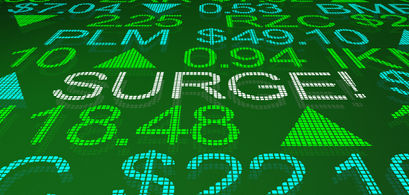After a disastrous finish to 2022 following the aftermath of the infamous Twitter takeover, Elon Musk retrieves the world’s richest person once again. Musk’s automaker company Tesla lost a staggering 69% in value throughout 2022, only to regain 69% in a matter of two months this year.
Over the past few years, we’ve been used to Tesla making the headlines for similar increases and drops in value – but its movements are just one example of many surges that happened over time.
Moneyzine.com has put together a list of some of the most spectacular price increases that have occurred in this century.
2000 – Plug Power rides the dot-com bubble
The stock market was dominated by tech equities by the time we entered the new millennium. The notorious dot-com bubble was primarily blown by the explosive popularity of tech-related businesses, along with the bullish behaviour in the stock market. Between 1995 and its peak in March 2000, the tech-led Nasdaq Composite Index rose by a staggering 400%.
The dot-com bubble not necessarily only served web-related startups, though. Plug Power, specialising in fuel cell turnkey solutions, has emerged as one the biggest gainers of the early millennia bubble for a brief, shiny period. The company went public in October 1999, and its shares rose steadily higher thereafter. On a single day, between January 6th and the 7th in 2000, the price climbed by 74.16% and peaked at $1,497.50 on March 10th.
2008 – Volkswagen: “Mother of all short-squeezes”
At the height of the 2008 global financial crisis, Volkswagen briefly became the “priciest firm” and the largest by market capitalisation. The drama began to unfold as Porcshe announced that it wanted to boost its shareholdings of Volkswagen and went on to buy fairly a large amount of stocks in the company. This ended up pushing the stock prices higher and led VW to come into hedge funds’ radar. They believed that VW stock had become overvalued because the carmaker was in substantial debt at the time, so they increased their short positions and bet that the stock prices would eventually plummet.
Came October 26, Porsche announced that they now hold a staggering 74.1% of all VW shares. This ultimately meant that the amount of VW shares that were available for sale suddenly came down to a mere 6%. It was a nightmare scenario for short sellers – they essentially bet against companies by borrowing shares and selling them in a bid to buy them back at a lower price when prices drop. Yet, after Porche’s takeover, it was impossible for them to buy back their required shares and close their positions.
As the short sellers attempted to liquidate their short positions, the stock price rose by 93% at its highest point and sold for over $900.
2011 – Gateway Industries: A stock market fairy tale
What happened to Gateway Industries was nothing short of a fairy tale story of its own kind, what every penny stockholder is hoping for. The firm started as nothing significant; at the time of the takeover, it was a dormant web design company being traded for about 2 cents a share, operating with one employee (the CEO Jack Howard). And enter Robert F.X. Sillerman, a renowned media entrepreneur best known for owning the company that developed the iconic talent show the American Idol.
Sillerman announced that he will be taking over the company to be his pad for a new venture, which almost immediately sent its stock soaring from 2 cents to nearly $3 – a whopping 25,000% gain. Gateway had no revenue the year before and had a total of $5 at hand. For the takeover, Sillerman and other investors bought 120 million shares at 3 cents each and bought the company for $3.6 million.
2013 – Facebook the comeback kid
Facebook’s, or Meta’s, stock market debut was fairly anti-climactic. Since he found the company in 2004, Zuckerberg was adamant that he will not take the company public, or let any buyouts to realise. After years of anticipation, Facebook held its initial public offering (IPO) on Friday, May 18, 2012. At the end of the day, the stock closed at $38.23, only $0.23 above its IPO price.
Nevertheless, a year after the company scored the single most successful day of its history on the market as of this writing. Entering 2013 and still under the unpleasant spell of the IPO fiasco, investors approached Facebook with caution despite its stellar performance at the time. The company boosted its revenue by 43% year-on-year, but the stock price remained flat well into 2013. Things changed direction by July of the same year: the second-quarter report disclosed that ad revenue jumped by a staggering 61%. In a single quarter, Facebook’s overall revenue coming from mobile increased from 31% to 41%.
The boosted investor confidence in the social media industry created an encouraging backdrop to Facebook’s market success. LinkedIn, Facebook’s close competitor at the time, released similarly successful quarterly reports while other companies like Yelp and Groupon also scored significant increases in stock valuation.
In a single day, the stock price rose by 30%. It more than doubled (102%) in 2013 overall.
2021 – GameStop: Eat the rich!
The GameStop saga is perhaps one of the most explosive market events in recent memory. It arguably cemented the relevance of retail investors within the larger picture – who collectively prevented a company from going under.
The aftermath of the pandemic saw an increase in short-selling activities across the board. GameStop, an old fixture of forgotten malls and a dying brick-and-mortar store, had become the prime candidate to bet against. Hedge funds, most notably Melvin Capital, placed multi-billion dollar short trades against GameStop at the backend of 2020.
Reddit’s r/WallStreetBets community detected the unusually high short interest against the troubled firm and decided to take up arms against it. Retail investors organised and begin heavily investing in the company stocks, which led prices to rise sharply following January 13, 2021, and commenced one of the most phenomenal short squeezes of all time. Within just seven days, between 20 and 27th of January, the GME price rose by 157.7%. Hedge funds were forced to close down their positions, with Bloomberg noting a total of $6 billion loss due to the squeeze. Melvin Capital was shut down a few months later.
One of the most popular discount brokerages, Robinhood, ironically named for this occasion, imposed trading restrictions between January 28-29 following the peak on the 27th, barring opening new long positions on GameStop stocks. This triggered an uproar among the users, the press, and some politicians.
Where are they now?
It’s rare for companies to ride through the momentum they gain from surges as listed here. More often than not, they lose most of their gains quickly. Here’s how these firms performed afterwards;
Plug Power returned to similar prices ($384.38) that it entered 2000 with by the September same year. From its peak in March, that’s a 289.5% decrease. As of March 2023, the company is traded for $13.56 per share.
Volkswagen lost more than half (56.44%) of its value the very next day. Yet, the company remained relevant and maintained a successful track record to this day. Porsche and VW officially merged back in 2011, and today, it’s the largest carmaker in Europe. You can buy a share of VW for about $140.
Gateway Industries lost a third of its gains the next day, and its stock price dropped to $1.89 from about $3. Sillerman consolidated the firm with a few other outfits to create a startup media and entertainment firm Function (X), later renamed Viggle Inc. The company is privately owned now.
The stock price of Meta has steadily increased until 2022 and took a sharp downturn after losing 24% of its value in a single day. This was largely due to the weakening financials of the company as their ambitious Metaverse project didn’t meet expectations and a drop in ad revenue as the regulations around digital advertising gets tighter. Yet, after plans on increasing efficiency and laying off a total of 13% workforce, the stocks climbed by 24% recently, scoring the highest daily percentage gain since 2013. As of this writing, you can buy a Meta share for $184.09.
Gamestop’s share value never went back to what it was before the surge, but the peak in January did drop and prices stabilised to fluctuate around $35 and $50 by May 2021. The prices have been on a steady decrease since mid-2022 and stand at $17.93 today.
Stock surges like these usually make trading evermore attractive, especially for new investors. But what these figures show us is that they can, and have, stem from various other factors other than a company’s financial outlook, and do not always result in a sustained appreciation in the long term. Novice traders must be aware of various factors that affect price swings and be mindful when chasing trends.Jonathan Merry, the CEO of Moneyzine.com
Contributors





